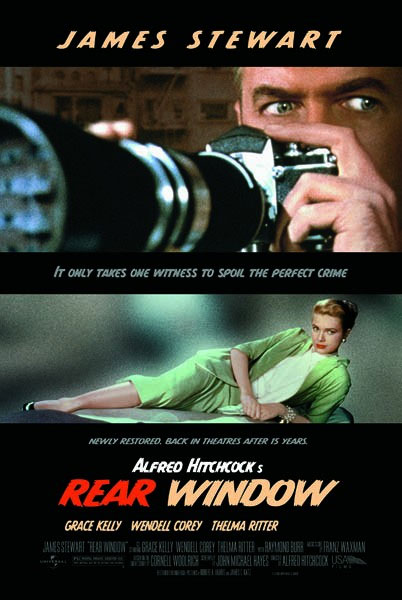 e between Stella and Charlie has absolutely nothing to do with the plot of stealing the gold. Most of the time this romance and sexual tension does not fit the main plot at all and therefore has to create a side story just for it self. This is not ever really noticed because over time we have come to expect this in movies.
e between Stella and Charlie has absolutely nothing to do with the plot of stealing the gold. Most of the time this romance and sexual tension does not fit the main plot at all and therefore has to create a side story just for it self. This is not ever really noticed because over time we have come to expect this in movies.When I think about this topic I cannot help but notice a growing trend. If one considers the films from the nineteen fifties and sixties one will notice less of the objectification of the female body than to today. Yet the objectification back then was an aspect of the culture of that time as is the objectification of today. There has been a trend both in film and in our culture of women wearing more scandalous things and acting in ways that would not have been appropriate a few years ago. This trend in both culture and film shows that they are interconnected. In my opinion film simply provides a very good visual medium for the objectification of women and therefore is easily used to show our cultures thoughts on the matter. Over time as our culture has
 changed so has film. As this chance has occurred we have slowly become more and more desensitized to the objectification of women. This is really not that different to the way we have become desensitized to violence. Violence in films such as psycho seemed to push the limit when it was made but seems like nothing compared to the films of today. The same is true for romance in movies, the objectification of the women in Hitchcock's rear window was seen as pushing the line in 1954 but against movies of today is almost nothing.
changed so has film. As this chance has occurred we have slowly become more and more desensitized to the objectification of women. This is really not that different to the way we have become desensitized to violence. Violence in films such as psycho seemed to push the limit when it was made but seems like nothing compared to the films of today. The same is true for romance in movies, the objectification of the women in Hitchcock's rear window was seen as pushing the line in 1954 but against movies of today is almost nothing.All that being said I feel that reprimanding film for its objectification is not fair. While there are stereotypes in film that have developed and could be removed they are a result of our cultures reflection on the nature of film.
Something that bothered me in my reading of Mets and Mulvey was that both of them used freud theory to back up there arguments. While parts of his theory are still somewhat useful the theory itself has been proven false many times and is now looked upon as something not reputable enough to really support an argument. Specifically I do not agree with Mulvey when she talks about mans fear of castration when he looks upon a females body. If that fear was really a determining factor in anything to do with the objectification of women and the development of early children then I feel the objectification would be less because of it.

This comment has been removed by the author.
ReplyDeleteYour last paragraph, which is somewhat of a tangent to your main argument of how the objectifications of violence and women in film and society have exploded recently, could actually merit a full book's worth of explanation. Freud is a very controversial figure, mainly due to the radical nature of his ideas. It’s true that Austrian-British philosopher Karl Popper argued in his 1963 book Conjectures and Refutations that Freud's psychoanalytic theories were presented in untestable form and that Psychology is now and has been scientifically oriented for quite some time. Nevertheless, researchers in the emerging field of neuro-psychoanalysis have argued for Freud's theories, pointing out brain structures relating to Freudian concepts such as libido, drives, the unconscious, and repression. The point is, whether he was right or not, Freud still has a tremendous amount of impact on psychologists and other people who study how the mind think.
ReplyDeleteTherefore, I do not condemn Laura Mulvey and Christian Metz for using Frued’s theories to back up their psychoanalytic film arguments. I know basically nothing about psychology, but I was able to follow the line of reasoning that both authors offered. And whether or not you agree with their method for arriving at their conclusion, you said yourself that their conclusion is correct–“In reading what Mets and Mulvey have to say on the objectification of women in the movies of today I find it very hard to refute what they have to say.” Women are presented as spectacles and objects for male desire in film. It is hard to say whether or not this is derived from a women’s lack of penis or societal pressures, but it is true regardless
Film is meant to be a reflection of our culture at the time. When you look at multiple adaptations of films, you see the presence of the time period's culture all over the film. Even if the film is not an adaptation, culture is still very prominent in the ideas of the film.
ReplyDeleteWestern's are a good example of this. Everyone has a good idea of what a Western should look like. It should have horses, cowboys, and bad guys. But after that, the director and everyone else working on the film are free to do anything. Even something as little as the haircuts of the actors tells millions of stories about the culture of the time period.
As a society we have become too desensitized at things that would shock people from the fifties and sixties. When we see acts of violence on the news, we don't even bat an eyelash. One could only imagine how society is going to be in fifty years if we have become desensitized to everything from violence to sex in films and on television.
Jacob-
ReplyDeleteIt is strange that movies always contain that "love" plot within the actual plot of the film. As if in reality romance occurs at every opportunity in our lives. I don't think I can explain why movies do this other than the fact that people like watching it and movies take advantage of this pleasure.
Also, your point of the fallibility of psychoanalytic theory is dead on, I think. Freud's theories, although fascinating, have no empirical evidence and yet they are applied here intensely to explain the pleasure of film. It does seem a bit ludicrous to think women have "penis envy" and men have "fear of castration" and that is, ultimately, how pleasure is derived. I think Mulvey and Metz take their analysis to far away from the simplicity of enjoying a film.
At the same time, I do not think I can judge their theories to harshly because when they were writing them, Freud's theory was at its peak of success within the field of psychology. It is only now that Freud's theories are looked upon as ridiculous.
I found your comment about not reprimanding film for its objectification particularly interesting. The idea that this cinematic treatment of women has developed as a result of our culture's acceptance of these stereotypes raises several serious questions. This seems to be an example of the "chicken-egg" debate: if our culture has allowed these stereotypes to be perpetuated via one of its most influential entertainment mediums, shouldn't film then be considered partially responsible for their continuing evolution and prevalence? Film has the power to shape culture as much as it is shaped by the prevailing attitudes of society, and should therefore be held accountable for the impact of endorsing and perpetuating these ideas.
ReplyDeleteI was also intrigued by the idea that the way in which women are objectified in film has evolved in concurrence with the changing nature of our culture's stereotypes. I think that the James Bond franchise is an excellent representation of that idea. From the very first film, Dr. No, it was clear that women were to be portrayed as disposable enjoyments who were available at any moment and willing to be discarded as soon as they had served their purpose. This theme has remained constant as the series has continued, but there has been some development in the behavior and attitudes of Bond's conquests. There has been more of a move toward including a particularly powerful central female character in each film, rather than a seemingly endless list of women who appear briefly and serve only a peripheral role. Additionally, these female characters are no longer limited to the roles of assistants to the male villains, or helpers to Bond who end up causing more trouble than they are worth. They are nuclear physicists, spies who hold the same rank as Bond, and often the masterminds behind a plot to bring our hero down. They embrace their sexuality on their own terms and establish a type of equality with Bond rather than accepting the role of a helpless conquest. And yet, they never carry over from one film to the next, and it is always clear to the viewer that the real mastermind behind it all is the spy himself.
You bring up an excellent point that female objectification (which most everyone can agree is unrealistic at best and chauvinistic at worst), is not so much an "inherent evil" of film, so much as film's representation (and, admittedly, perpetuation) of our own stereotypes and objectifying tendencies in modern Western culture. Film is a foil for our own prejudices and preconceptions, showing in vivid, 16mm detail our own follies and foibles in frame-by-frame format. (Quintuple alliteration score!)
ReplyDeleteFilm only shows us that which we WANT it to show; if we want sex, scandal, and sin, we get sex, scandal and sin (probably in the form of "Sin City" the film). If we want horrific violence, gut-wrenching suspense and nauseatingly detailed gore, we get "Friday the 13th" and it's many, many, MANY sequels, spin-offs and series. Thus, I agree that it is not film's fault for "forcing" fully fetishized female forms at the viewer.(octuple alliteration score!)
Rather, it is largely the fault of us, the viewer, for not demanding a more realistic or "gender neutral" cinematic experience, where both sexes receive the benefits of fair and balanced portrayal instead of sensationalized stereotypes and super-sexualized spectacles of sensuality and skewed perception. (sextuple alliteration score!)
Still, I feel like viewers will always want and crave the "spectacle" aspects of film; simply put, if "realism" and "gender neutrality" were at all interesting or appealing, we wouldn't flock to movies to escape our relatively "real" and "gender-equal" lives. Feel free to debate the gender-equality (cue the feminists) or reality (cue the Cartesians) of our existence if you want. Personally, I'll just continue to enjoy the movies either way.
And an amazing aptitude (and "ability") at active alliterative applications. God, I wish there was a medal for this stuff...